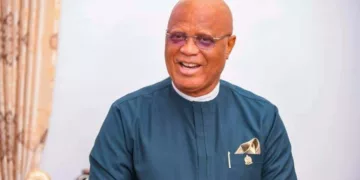Vice President Kashim Shettima has called on leaders to groom successors who are better than them for the sake of sustaining democracy.
The vice president stated this at the unveiling and public presentation of a book written by Dr Goke Adegoroye, a retired federal permanent secretary, on Thursday in Abuja.
The News Agency of Nigeria (NAN) reports that the title of the book is: “Leadership in the Nigerian Civil Service, Five Decades of Lessons in Performance, Encounters and Triumphs.”
Shettima, represented by the special adviser to the president on Special Duties, (Vice President’s Office),
Dr Aliyu Umar, said Nigerian leaders must make succession planning a way of governance.
He described the book as a gift to a nation that is still finding its rhythm, adding that it was a call to see mentorship as an act of responsibility, not charity.
“The sustainability of every form, the credibility of every institution, and the very soul of our democracy, depend on the willingness to prepare successors, who are better than us.
“Our history is littered with policies that began well but vanished with their pioneers because no one was prepared to carry the torch forward.
“We must speak plainly — a political culture that does not believe in succession is not designed to survive, it is designed to fail,” he said.
Shettima said President Bola Tinubu is a model in Nigeria’s political history, as far as leadership succession planning is concerned.
“Long before succession planning became a buzzword, he had already sown his seeds across Nigeria’s political and administrative terrain.
“His genius was not only in leading but in identifying those who could lead after him in Lagos.
“He built institutions, empowered people, and mentored a generation of technocrats and politicians, who have continued the work he had begun outside Lagos and Nigeria,” he said.
The vice president emphasised that continuity was not accidental but a result of foresight, adding that foresight was what leaders must institutionalise across all spheres of national life.
He urged Nigerian leaders to bridge the gap between potential and opportunity, and build a nation, where every child knows the path of leadership is paved by preparation, not privilege.
Shettima admonished leaders to deliberately nurture, train, equip, inspire and mentor the young ones to succeed them, adding that no reform would outlive its architects unless it was institutionalised through deliberate succession.
“We cannot leave the future to chance. We must prepare the next generation of leaders. If we fail to be leaders, we cannot be surprised when institutional or institutions collapse.
“Leadership is not performance. It is sacrifice, and sacrifice cannot be taught in theory, it must be nurtured through mentorship and examples.
“Our young people are watching but watching is not enough, they must be engaged, they must be trained, they must be trusted,” he said.
He noted that the event was an opportunity to honour the author, reflect on the moral compass of public service, and “hold a mirror to ourselves, to our institutions and to the future.”
He said that the public service was a laboratory for reform while its strength lied in the quality of the young ones waiting in the wings.
Also speaking, the author described the book as his reflection and introspection to offer advice and guidance to Nigeria’s elected, appointed and career leaders on governance and public service.
He expressed the belief that the lessons, tips and recommendations provided in the book would offer a pathway to enhancing leadership effectiveness in the Nigerian civil service.
“I was unable to see the impact of my 35 years of service to the nation. My 35 years of service was more than what it took to transform Singapore from Third World to First World.
“It was more than what it took China to move from its current position as the second largest economy in the world, and more than what it took Dubai, Malaysia and Brazil to transform from sleepy to vibrant economies,” he said.
Adegoroye said that he identified two main groups, the civil service and the political class, as the major problems of Nigeria.
He detailed the challenges to include the rampant corruption and political meddling in the civil service; political transition from one administration to the other; as well as politics and election.
Earlier, chairman of the occasion, Chief Olu Falae, the Baba Oba of Akureland, urged others to write their memoirs like Adegoroye.
The former secretary to the government of the federation, said “So I want to appeal to all of us that we must discard any modesty, any preoccupation with other engagements and put down for posterity your experiences and achievements.
“The situation in the future may be different, but the methods of resolving problems and crises will remain valid; we’re not writing for this generation, we’re writing for posterity, so please do try to write,” he said.
Head of the Civil Service of the Federation, Mrs Didi Walson-Jack, represented by the permanent secretary in her office, Dr Deborah Odoh, described the book as capable of making the civil service efficient, productive, incorruptible, and citizen-centred.
She expressed the hope that it would also serve as a guiding resource for public servants, policymakers, scholars, and other stakeholders in the development of the nation.











